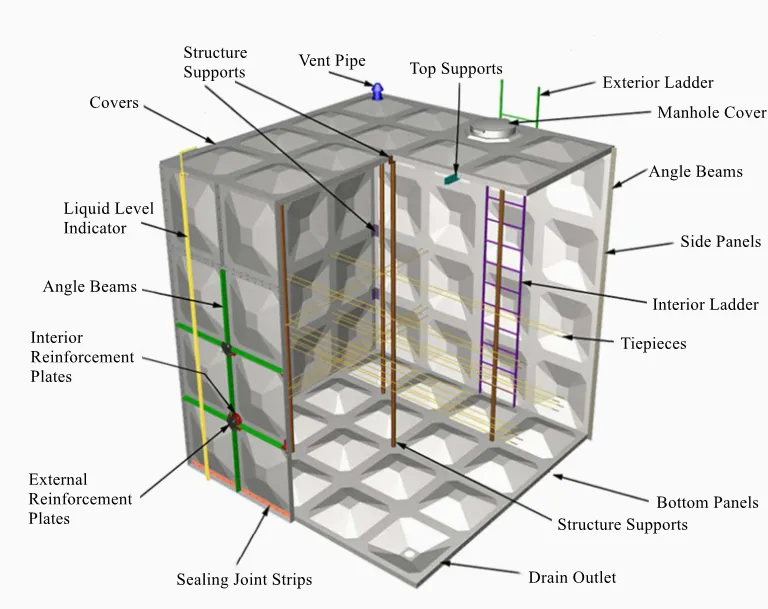loading...
- No. 9, Xingyuan South Street, Dongwaihuan Road, Zaoqiang County, Hengshui, Hebei, China
- admin@zjcomposites.com
- +86 15097380338
- Welcome to visit our website!
Industrial Water Treatment Solutions for Effective Wastewater Management and Resource Recovery
Industrial Water Treatment Equipment An Essential Component for Sustainable Operations
In today's world, where water scarcity and pollution are escalating concerns, industrial water treatment equipment has become a crucial element for industries worldwide. This equipment plays a vital role in ensuring that water used in various industrial processes is safe, reusable, and compliant with environmental regulations. The significance of water treatment cannot be overstated, as it not only facilitates operational efficiency but also demonstrates a commitment to sustainability.
Types of Industrial Water Treatment Equipment
Industrial water treatment systems encompass a range of technologies and equipment designed to purify and manage water for various applications. These systems can be broadly categorized into several key types
1. Filtration Systems These systems use physical barriers to remove suspended solids and particles from water. Different types of filters, such as sand filters, cartridge filters, and membrane filters, are used depending on the specific application and desired water quality.
2. Chemical Treatment Systems These involve the addition of chemicals to the water to remove impurities or adjust its properties. Common methods include coagulation and flocculation, where chemicals are added to cluster particles together for easier removal, and disinfection processes that typically use chlorine or ultraviolet light to eliminate pathogens.
3. Reverse Osmosis (RO) Systems RO is a highly effective method for desalinating water and removing a wide range of contaminants. This technology employs a semi-permeable membrane to separate ions and molecules from water, providing high-quality purified water suitable for many industrial processes.
4. Wastewater Treatment Plants These facilities are designed to treat industrial wastewater before discharge or reuse. They combine biological, chemical, and physical processes to remove contaminants from wastewater effectively, ensuring that it meets regulatory standards.
5. Water Softening Equipment Hard water containing high levels of calcium and magnesium can lead to scaling and damage in industrial equipment. Water softeners employ ion exchange technology to remove these ions and extend the lifespan of machinery and piping systems.
industrial water treatment equipment

The Importance of Water Treatment
The effectiveness of industrial processes heavily relies on the quality of water used. Contaminated water can lead to equipment failures, production downtime, and increased operational costs. By investing in industrial water treatment equipment, companies can enhance efficiency, reduce waste, and lower their environmental impact. Moreover, reusing treated water can significantly decrease freshwater consumption, aiding industries in achieving sustainability goals.
Compliance and Regulatory Standards
Regulatory pressures are increasingly compelling industries to adopt robust water treatment solutions. Governments around the world have established regulations governing water quality and effluent discharge, necessitating investments in treatment technology. Compliance with these regulations not only avoids costly fines but also enhances a company's reputation as a socially responsible entity. Industries that prioritize water treatment demonstrate their commitment to ecological stewardship, attracting customers and investors who value sustainability.
Innovations in Water Treatment Technology
The field of water treatment is continuously evolving. Recent innovations, such as advanced oxidation processes, membrane bioreactors, and automation in monitoring and control systems, have significantly improved the efficiency and effectiveness of water treatment equipment. These technologies are helping industries achieve higher purification levels while minimizing energy consumption and operational costs.
Conclusion
Industrial water treatment equipment is an essential component of modern manufacturing and production processes. As industries face growing pressures related to water scarcity and pollution, the adoption of effective water treatment solutions is not just a regulatory requirement; it's a business imperative. Investing in sophisticated water treatment systems not only safeguards operational integrity but also contributes to a sustainable future. By prioritizing water treatment, industries can lead the charge in environmental stewardship, ensuring their long-term viability while protecting precious water resources for generations to come.
-
GRP Structures: The Future of Lightweight, High-Performance EngineeringNewsJun.20,2025
-
FRP Water Tank: High-Performance Storage for Corrosive and Clean Water SystemsNewsJun.20,2025
-
FRP Square Tube: The New Industry Standard for Chemical and Structural ApplicationsNewsJun.20,2025
-
FRP Pultruded Profiles: The Ultimate Choice for Lightweight Structural StrengthNewsJun.20,2025
-
FRP Handrails: The Safer, Smarter, and Stronger Choice for Modern InfrastructureNewsJun.20,2025
-
FRP Grating: The Smart Solution for Durable, Lightweight Industrial FlooringNewsJun.20,2025
-
Why Choose a Galvanized Water Tank for Your Storage NeedsNewsMay.21,2025
